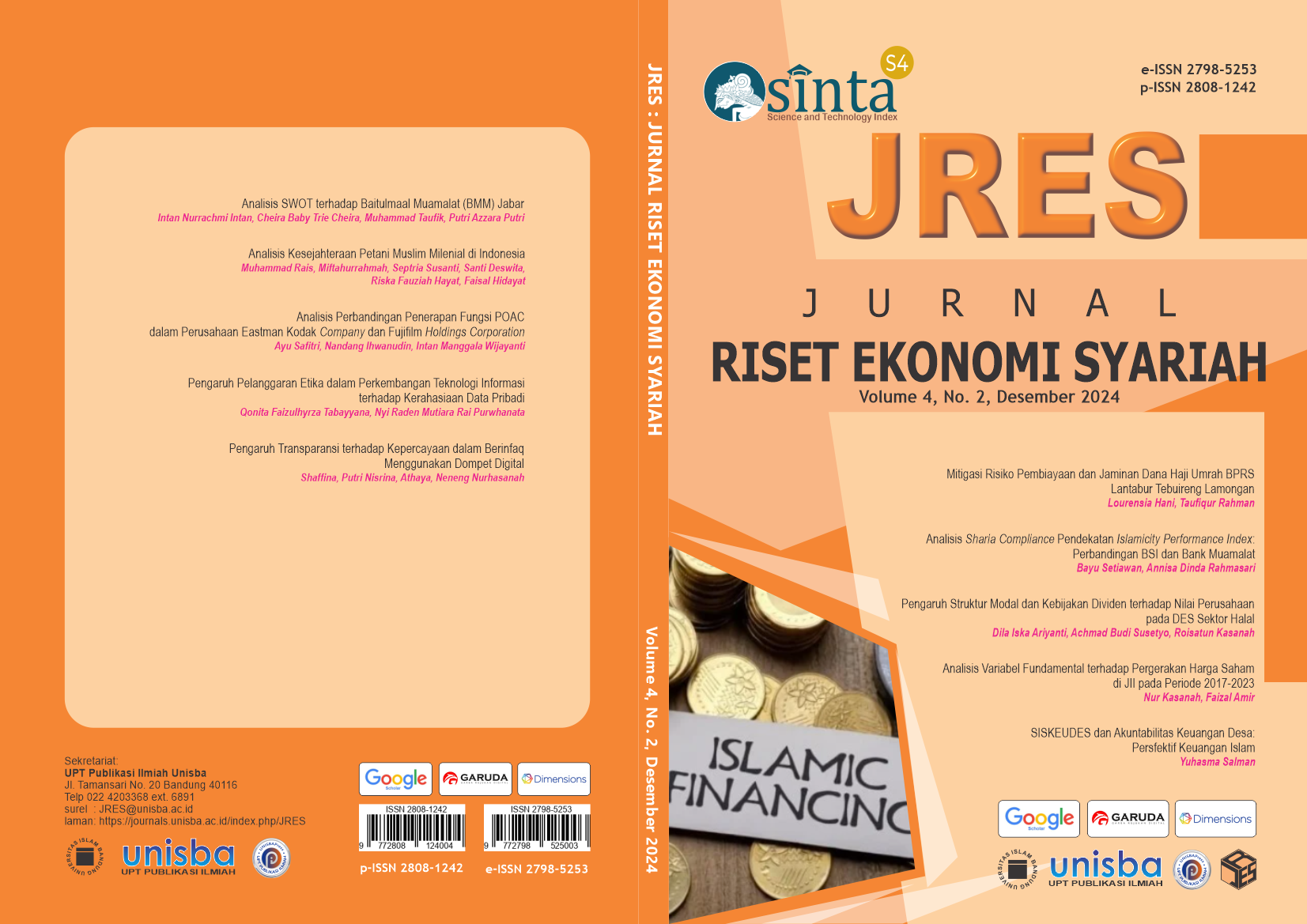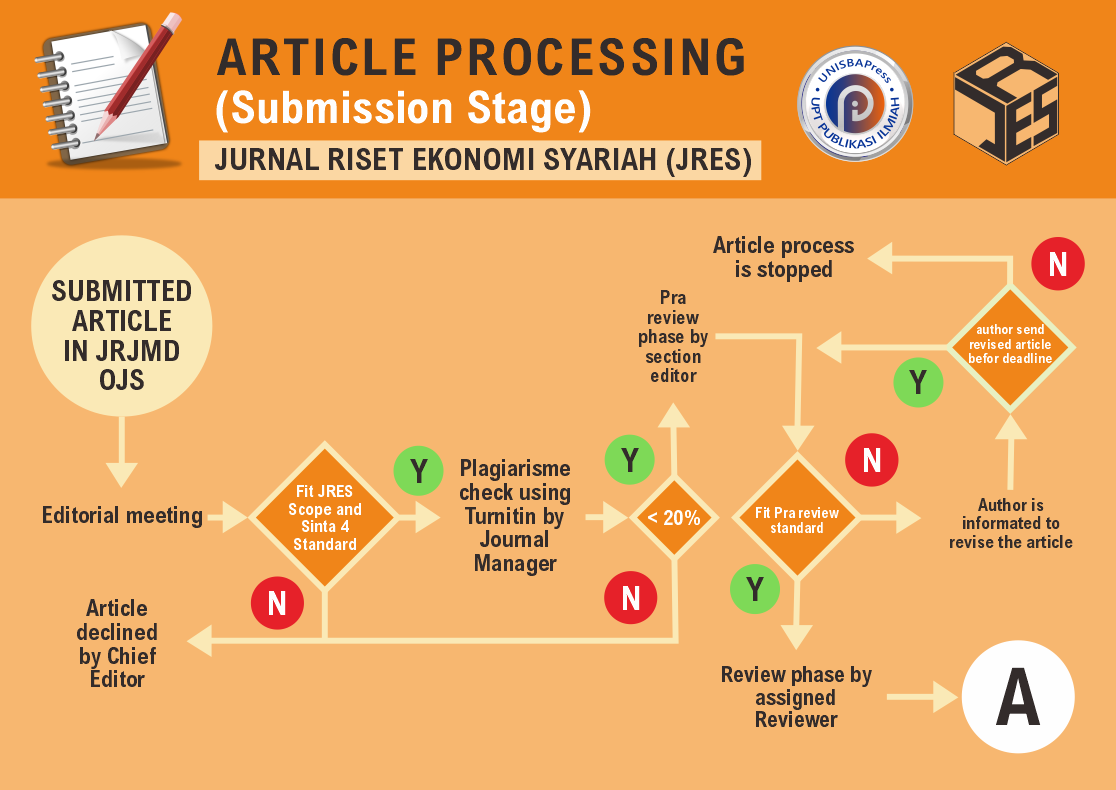Pengaruh Pelanggaran Etika dalam Perkembangan Teknologi Informasi terhadap Kerahasiaan Data Pribadi
DOI:
https://doi.org/10.29313/jres.v4i2.4355Keywords:
Etika Teknologi Informasi, Privasi data, Perlindungan Data PribadiAbstract
Abstrak. Perkembangan teknologi informasi membawa perubahan signifikan dalam berbagai aspek kehidupan, namun juga menimbulkan tantangan terkait keamanan dan privasi data pribadi. Volume dan nilai data pribadi yang tersimpan secara digital rentan terhadap penyalahgunaan. Penelitian ini bertujuan untuk mengidentifikasi dan menganalisis berbagai bentuk pelanggaran etika dalam perkembangan dan penerapan teknologi informasi. Metodologi yang digunakan adalah pendekatan kualitatif dengan metode literature review sistematis, menggunakan teknik purposive sampling untuk menganalisis artikel ilmiah dan buku yang relevan dari database akademik seperti Google Scholar dan Scopus. Hasil penelitian mengidentifikasi berbagai pelanggaran etika, termasuk pengumpulan data berlebihan, penyalahgunaan data, kebocoran data, serta kurangnya transparansi dan kontrol pengguna. Dampak dari pelanggaran ini meliputi kerugian finansial dan emosional, penurunan kepercayaan publik terhadap institusi digital, serta potensi perubahan fundamental dalam struktur sosial dan proses demokrasi. Penelitian ini menghasilkan rekomendasi konkret untuk memperkuat perlindungan data pribadi, termasuk perbaikan kerangka regulasi, peningkatan standar etika dalam pengembangan teknologi, serta strategi untuk memberdayakan pengguna dalam mengelola dan melindungi data pribadi mereka.
Abstract. The development of information technology has brought significant changes in various aspects of life but challenges the security and privacy of personal data. The volume and value of digitally stored personal data has made it vulnerable to misuse. This research aims to identify and analyze forms of ethical violations in the development and application of information technology. The methodology used is a qualitative approach with a systematic literature review method, using purposive sampling techniques to analyze relevant scientific articles and books from academic databases namely Google Scholar and Scopus. This research identified forms of ethical violations, including excessive data collection, misuse of data, data leaks, lack of transparency and user control. The impact of this breach includes financial and emotional harm, the public distrust in digital institutions, and the potential for fundamental changes in social structures and democratic processes. This research produces concrete recommendations to strengthen personal data protection, including improvements to the regulatory framework, increased ethical standards in technology development, and strategies to empower users to manage and protect their personal data.
Downloads
References
Acquisti, A., Brandimarte, L., & Loewenstein, G. (2015). Privacy and human behavior in the age of information. Science, 347(6221), 509-514.
Bisogni, F., & Asghari, H. (2020). More than a suspect: An investigation into the connection between data breaches, identity theft, and data breach notification laws. Journal of Information Policy, 10, 45-82. https://doi.org/10.5325/jinfopoli.10.2020.0045
Cohen, J. E. (2019). The age of surveillance capitalism: The fight for a human future at the new frontier of power. Surveillance & Society, 17(1/2), 240-245.
De George, R. T. (2008). The ethics of information technology and business. John Wiley & Sons.
Fontes, C., Hohma, E., Corrigan, C. C., & Lütge, C. (2022). AI-powered public surveillance systems: why we (might) need them and how we want them. Technology in Society, 71, 102137. https://doi.org/10.1016/j.techsoc.2022.102137
Fussey, P., & Murray, D. (2019). Independent report on the London Metropolitan Police Service’s trial of live facial recognition technology. University of Essex
Gaglione Jr, G. S. (2019). The equifax data breach: an opportunity to improve consumer protection and cybersecurity efforts in America. Buff. L. Rev., 67, 1133.
González-Cantón, C., Boulos, S., & Sánchez-Garrido, P. (2019). Exploring the link between human rights, the capability approach and corporate responsibility. Journal of Business Ethics, 160(4), 865-879.
Hamilton, L., Robb, E., Fitzpatrick, A., Goel, A., & Nandigam, R. (2018). Generating Text Summaries for the Facebook Data Breach with Prototyping on the 2017 Solar Eclipse. http://hdl.handle.net/10919/86395
Hankey, S., Marrison, J. K., & Naik, R. (2018). Data and democracy in the digital age. The Constitution Society, 1-56.
Kaye, J., Whitley, E. A., Lund, D., Morrison, M., Teare, H., & Melham, K. (2015). Dynamic consent: a patient interface for twenty-first century research networks. European journal of human genetics, 23(2), 141-146.
Kramer, A. D., Guillory, J. E., & Hancock, J. T. (2014). Experimental evidence of massive-scale emotional contagion through social networks. Proceedings of the National Academy of Sciences, 111(24), 8788-8790. https://doi.org/10.1073/pnas.1320040111
Kuhn, M. L. (2018). 147 million social security numbers for sale: Developing data protection legislation after mass cybersecurity breaches. Iowa L. Rev., 104, 417.
Langner, V. L. (2023). Influence and ethical impact of design of technology on user behavior (Doctoral dissertation, Technische Hochschule Ingolstadt). https://nbn-resolving.org/urn:nbn:de:bvb:573-40469
Levin, A. (2018). Privacy by design by regulation: The case study of Ontario. Can. J. Comp. & Contemp. L., 4, 115.
Mubarokah, A. (2023). View of Market Religion and Religion Marketplace in Digital World. https://doi.org/10.29313/jres.v3i1.1724
Natamiharja, R. (2018). A Case Study on Facebook Data Theft in Indonesia. Fiat Justisia: Jurnal Ilmu Hukum, 12(3), 206-223. https://doi.org/10.25041/fiatjustisia.v12no3.1312
Sanger, D. E., Perlroth, N., Thrush, G., & Rappeport, A. (2018). Marriott Data Breach Traced to Chinese Hackers. The New York Times, A1-L.
Schaub, F., Balebako, R., Durity, A. L., & Cranor, L. F. (2015). A design space for effective privacy notices. In Eleventh symposium on usable privacy and security (SOUPS 2015) (pp. 1-17).
Shaffer, G. (2021). Applying a contextual integrity framework to privacy policies for smart technologies. Journal of Information Policy, 11, 222-265. https://doi.org/10.5325/jinfopoli.11.2021.0222
Stoyanovich, J., Howe, B., & Jagadish, H. V. (2020). Responsible data management. Proceedings of the VLDB Endowment, 13(12).
Suryaningsih, S. S., Rojak, E. A., & Himayasari, N. D. (2023). Analisis Fiqh Muamalah dan Pasal 1320 Kuhperdata terhadap Perjanjian Endorsement Melalui Direct Message. Jurnal Riset Ekonomi Syariah, 3(2), 91–98. https://doi.org/10.29313/jres.v3i2.2790
Tay, L., Woo, S. E., Hickman, L., Booth, B. M., & D’Mello, S. (2022). A conceptual framework for investigating and mitigating machine-learning measurement bias (MLMB) in psychological assessment. Advances in Methods and Practices in Psychological Science, 5(1), 25152459211061337. https://doi.org/10.1177/25152459211061337
Twenge, J. M., Joiner, T. E., Rogers, M. L., & Martin, G. N. (2018). Increases in depressive symptoms, suicide-related outcomes, and suicide rates among US adolescents after 2010 and links to increased new media screen time. Clinical psychological science, 6(1), 3-17. https://doi.org/10.1177/2167702617723376
Vosoughi, S., Roy, D., & Aral, S. (2018). The spread of true and false news online. science, 359(6380), 1146-1151. https://doi.org/10.1126/science.aap9559
Wacks, R. (2015). Privacy: A very short introduction. OUP Oxford.
Wisniewski, P. J., & Page, X. (2022). Privacy theories and frameworks. In Modern socio-technical perspectives on privacy (pp. 15-41). Cham: Springer International Publishing.
Zuboff, S. (2015). Big other: surveillance capitalism and the prospects of an information civilization. Journal of information technology, 30(1), 75-89. https://doi.org/10.1057/jit.2015.5
Zuboff, S. (2023). The age of surveillance capitalism. In Social theory re-wired (pp. 203-213). Routledge.
Downloads
Published
Issue
Section
License
Copyright (c) 2024 Qonita Faizulhyrza Tabayyana, Nyi Raden Mutiara Rai Purwhanata

This work is licensed under a Creative Commons Attribution-NonCommercial-ShareAlike 4.0 International License.














